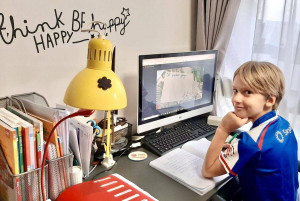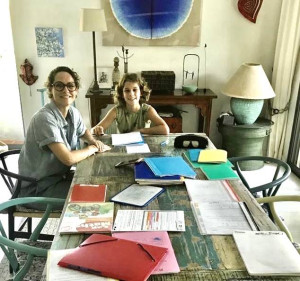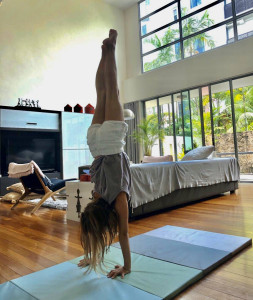International French School (Singapore) provides top tips on how to succeed during the distance learning
 The recent measures implemented by the Singapore Government to fight the spread of the COVID-19 virus brings with it some new challenges for all of us. This new situation requires a complete restructuring of our personal and professional environment. This “in-between”, where we are required to bring together several worlds in the same space, can be confusing. We are not quite at work, the children are not quite at school, but nobody is at home or on holiday either. It is therefore quite normal that we need time to adjust and adapt to this new context.
The recent measures implemented by the Singapore Government to fight the spread of the COVID-19 virus brings with it some new challenges for all of us. This new situation requires a complete restructuring of our personal and professional environment. This “in-between”, where we are required to bring together several worlds in the same space, can be confusing. We are not quite at work, the children are not quite at school, but nobody is at home or on holiday either. It is therefore quite normal that we need time to adjust and adapt to this new context.
In order to avoid a break in the academic rhythms of learning, the International French School (Singapore) has set up a home-based learning programme for all students. In parallel with this pedagogical support, supervised by the teachers, it is evident that parents will be involved and will play an important part in this new learning environment. Here are our tips to ensure the success of your home-based learning.
Manage the day
It is necessary to maintain a routine that is designed to duplicate the “normal” pattern of a typical day. The rules must be clear and you can suggest from the start a schedule of must-do’s. The aim will be to stay as close as possible to the children’s daily routine:
- Get your children in condition by explaining to them that home-based learning remains part of the school and that as such, they will have to wake up close to the usual time (+/- 1 hour), wash and get dressed so as not to forget the rhythm.
- Keep fixed meal times.
- Schedule teaching times: display the schedule of activities to be carried out, work to be done and zoom times.
- Plan moments of relaxation and fun.
- Do physical activities.
 Arrange your spaces
Arrange your spaces
It is important to arrange the spaces where the learning activities are to take place. To define together the limits that will allow for supervision and “protect” the necessary working times for each member of the family.
• If your child does not have a desk in his or her room, you can set up a temporary space dedicated to work that can also accommodate drawing, painting, or other activities.
• Find a suitable space where your child won’t be tempted to play.
• Your child should be able to work in a quiet environment. Thus, if the work area is in a common room, some devices must remain switched off during the learning time, (television, game consoles, radio, etc.). Avoid any other source of distraction, (chatting, household appliances, etc.).
• As far as possible, this workspace should remain the same from one day to the next so that your child can get into the routine and feel comfortable in that routine.
No pressure
The days when we are “locked in” are difficult to support over time and it is necessary for the children, (and adults) to breathe. In the classroom, teaching hours coexist with travel time, changes of subject, places, recreation and eating out. We cannot therefore impose on children or expect them to be at work from 8.30 am to 4 pm.
During these days, parent/child relationships can become strained. Indeed, adults must both make sure that the work required of the children is done, but also manage their own professional obligations. You can tell the children a period of time during which you may not be disturbed.
If at times the situation worsens, don’t hesitate to move away for a moment by changing rooms. Take a step back and lower the tension. It is necessary to be forgiving because even if many children do not say anything, they too sometimes have difficulty in coping with these deep changes in their environment.
Do not hesitate to ask your child’s school and teachers for help.
Don’t be alone! Homework can be a source of conflict between parents and children. All the more so in a context where adults have to balance their personal and professional lives. So don’t hesitate to:
- Alternate activities that require concentration with less challenging activities.
- Sequencing learning times and/or suspending them if tensions arise.
- Do not multiply the teaching aids. Teachers will continue to reinforce learning for the current school year. It is therefore not useful to try to get ahead of the class or to make them do more homework.
- Contact your child’s teacher(s).
 Maintain regular physical activity
Maintain regular physical activity
The closure of schools, extra-curricular activities, sports clubs but also of all the amenities for many condominium units deprives children and adults of physical activity, sports or fun. For the well-being of children, it will therefore be essential to keep them physically active. If national guidelines, the constraints of your place of residence but also your own obligations allow it, go out for a walk or a bike ride around your home. If this is not possible, maintain physical activity in your home. The internet is full of ideas for getting children moving.
Entertainment: time together and time apart
It’s important to be able to enjoy the day. To do this, call on your creativity and your imagination. Give rhythm to those days that are different from the usual. To make the bonds between parents and children more harmonious and peaceful, don’t hesitate to set up activities where everyone participates (board games, cooking, gardening).
Manage screen time
In a period of “containment”, the questions and debates around screens can quickly arise and is a concern. If you need time to telework, evaluate the advantages and disadvantages. If allowing screen time for children can allow you to focus on your work duties and contain pressure related to them, then this will still be a good thing. Your children will be fine, even if they have been given an hour and a half of screen time on a weekday when normally this is not the rule. Don’t try to be perfect in everything: managing the children, keeping up with their learning, your teleworking can be a heavy cognitive load.
WARNING, you are and must remain the guarantor of the time and content viewed. The most important thing is the selection of the media and to keep your bearings with the necessary adjustments. Parents will therefore have to define the boundaries between educational, recreational and hazardous uses.
Psychologists remain fully available by phone/visio for parents and students.
Primary School
Carole Rouviere
[email protected]
+65 6805 0113
Secondary School
Benjamin Simsek
[email protected]
+65 6805 0109


